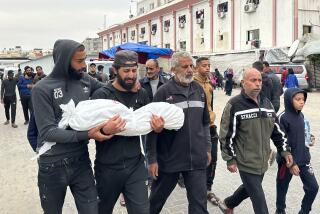U.N. Passes Resolutions to Keep Peacekeepers in Croatia
- Share via
WASHINGTON — Hours before the deadline, the U.N. Security Council unanimously passed a trio of resolutions Friday that extended the life of the U.N. peacekeeping operation in Croatia, revised its duties and separated it from missions in Bosnia-Herzegovina and Macedonia.
By doing so, the council appeared to avert the threat of a resumption of the war in Croatia. But the vague resolution that created a separate U.N. mission in Croatia left many threads hanging, and much hard negotiation is in store for U.N. officials before the mission can be assured of running smoothly.
Still, Deputy U.S. Ambassador Karl F. Inderfurth called the Croatia resolution “a constructive response to a complex, dangerous and tangled situation.”
“It is better than renewed war,” he went on, “but it does not, in itself, resolve the fundamental social, political and security-related issues that now divide Croatia.”
A peacekeeping crisis was precipitated weeks ago when Croatian President Franjo Tudjman said he wanted all 12,000 U.N. peacekeepers in his country to leave. He said their presence solidified the hold of the Croatian Serb separatists on a chunk of territory known as the Krajina.
But outsiders feared the peacekeepers’ withdrawal would precipitate a new war in Croatia. Tudjman found himself under intense pressure to relent. He finally did so after a meeting with U.S. Vice President Al Gore at a summit in Copenhagen in early March.
*
Tudjman relented only after Gore promised that the numbers of peacekeepers would be reduced and their duties revised. Tudjman wanted to ensure that peacekeepers would control the borders so military equipment could not reach Croatian Serbs.
But outside diplomats have had great difficulty working out the details in talks with the Tudjman government and Serbs in Krajina. Feelings have frayed, and passage of the Croatia resolution was delayed for a day because of an argument over the new name of the force in Croatia.
Croats insisted the mission title mention Croatia, while the Serbs insisted that it did not. The 15 council ambassadors brushed aside the Serbian objections and named the mission the U.N. Confidence Restoration Operation in Croatia.
The other resolutions did not change the goals of the mission in Macedonia and Bosnia but changed the name of the mission in Macedonia to the U.N. Preventive Deployment Force.
The operation in Bosnia will retain the name of the U.N. Protection Force. That is used now to cover the operations of all 31,000 peacekeepers in the former Yugoslav federation. The mandate for all the missions was extended for another six months.
The separation of the United Nations’ largest peacekeeping operation into three smaller missions was done to satisfy Tudjman’s demand for a mission that concentrated on Croatia. All three missions, however, will be under supervision of an overall commander.
In a revision of duties, the Croatia mission states that peacekeepers will assist “in controlling, by monitoring and reporting, the crossing of military personnel, equipment, supplies and weapons over the international borders” between Croatia and Bosnia and between Croatia and Serbia.
This appears to fall short of meeting Tudjman’s demand that peacekeepers control the border, but it may involve more monitoring than the Krajina Serbs would like. The council asked Secretary General Boutros Boutros-Ghali to report not later than April 21 on how well peacekeepers were carrying out this new assignment.
The Croatia resolution does not discuss the peacekeepers’ numbers. But a U.S. official has said the plan is to reduce the number from 12,000 to between 7,000 and 8,000; 1,000 peacekeepers would be assigned to “assisting in controlling” the borders.
*
Inderfurth took advantage of the resolution’s passage to berate Bosnian Serbs for what he called their “continued, blatant violation of human rights” in Bosnia.
“We wish to remind those guilty of human rights violations that they will be held personally responsible for their crimes,” he said.
He also attacked Bosnian Serbs for refusing to accept a peace plan advanced by what is known as the Contact Group--the United States, Russia, Britain, France and Germany. This plan would require Bosnian Serbs to give up much of the territory they now hold.
“Real solutions,” he said, “depend on the willingness of political leaders to make hard decisions--to accept peace as a goal and to compromise in order to allow communities to rebuild, children to live like children and parents to put food on the table at night. Here the responsibility for failure, thus far, rests squarely on the Bosnian Serb party for its unwillingness to enter into negotiations on the basis of the Contact Group plan.”
More to Read
Sign up for Essential California
The most important California stories and recommendations in your inbox every morning.
You may occasionally receive promotional content from the Los Angeles Times.













